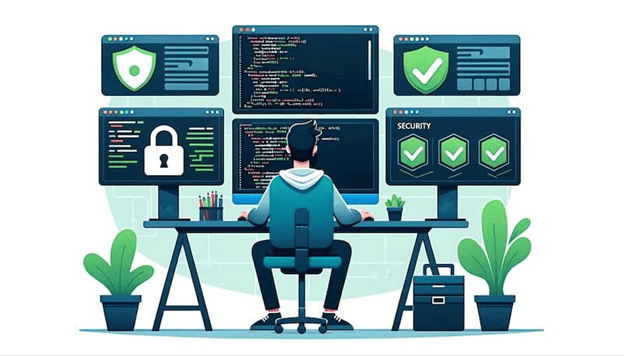Finding a reliable information security partner may seem like a daunting task, but the right choice can be the key to safeguarding your business against cyber threats. For small and medium businesses (SMBs), a strong security partnership isn’t just about preventing attacks — it’s about building a solid foundation that helps your business thrive while staying protected in an increasingly digital world.
To help you make a well-informed decision, let’s go through the main considerations when selecting a security provider.

Understanding Your Information Security Needs
The first step is to assess your business’s specific security requirements. Factors such as industry type, data sensitivity, company size and current IT infrastructure play a crucial role in defining these needs. For example, businesses handling sensitive customer information — such as payment details or healthcare records — require stronger security protocols than those with less digital interaction. By clearly identifying these requirements, you can better align them with the services offered by potential security partners, making sure that your business has the right level of protection in place.
Key Considerations When Choosing a Provider
Industry-Specific Expertise
Different industries face unique cyber security challenges and must adhere to specific regulatory standards to remain compliant. For example, healthcare companies must comply with HIPAA (Health Insurance Portability and Accountability Act), which mandates strict security measures to protect patient data. Any business that accepts credit card payments, regardless of industry, must comply with PCI DSS (Payment Card Industry Data Security Standard) to safeguard payment information, as failure to do so can result in breaches, fines, and lawsuits. Your security partner should be well-versed in such industry-specific regulatory frameworks, providing tailored solutions to address both compliance requirements and risks.
Comprehensive Service Offerings
Information security encompasses a wide range of services, from data encryption and intrusion detection to vulnerability management and disaster recovery. Your security provider should offer a comprehensive range of services that meet your needs and can scale as your business grows. Managed security service providers (MSSPs) are often a good fit for SMBs, as they can manage your cyber security requirements without the need for a dedicated in-house team.
Scalability for Future Growth
As your business expands, so will your security requirements. It’s imperative to join forces with a provider that offers scalable solutions, allowing your security measures to grow in step with your business. This is particularly important if you plan to adopt cloud computing or Internet of Things (IoT) technologies, which introduce new security vulnerabilities. A flexible partner can help you address these as they arise.
Evaluating Expertise and Certifications

Certifications are a clear indicator of a provider’s expertise and commitment to following industry best practices. Some certifications to look for when evaluating potential partners include:
- CISSP (Certified Information Systems Security Professional): This certification covers various areas of information security and is widely recognized in the industry.
- ISO 27001: Certification in this international standard indicates a company’s commitment to managing security risks.
- PCI QSA (Payment Card Industry Qualified Security Assessor): This certification authorizes professionals to assess a company’s compliance with the Payment Card Industry Data Security Standard (PCI DSS), ensuring secure handling of payment card data.
In addition to certifications, take the time to evaluate the provider’s reputation. Look for client testimonials, case studies and reviews from businesses in your field. A security partner with a strong track record helps reduce the risk of a breach, which can have serious financial and reputational consequences.
Customer Support and Service Level Agreements (SLAs)
In cyber security, reliable customer support is vital as threats can emerge at any time. Your security partner should provide continuous monitoring and be ready to respond swiftly to potential breaches. Offering 24/7 support with real-time threat detection is key for minimizing damage and preventing escalation.
An incident response plan is also essential, detailing how breaches will be handled and how the provider will assist with reporting requirements. Additionally, Service Level Agreements (SLAs) should outline the expected level of service — including fundamental metrics like response times and system performance — to meet your business’s operational demands.
Examples of Cyber Security Breaches
Real-world cyber security breaches highlight the importance of selecting the right security partner in protecting your business. Here are some significant examples of cyber security breaches:
- Equifax Breach (2017): A vulnerability in Equifax’s software led to the exposure of sensitive personal data for 147 million individuals. This breach emphasized the critical need for timely software updates and vulnerability management.
- SolarWinds Hack (2020): Attackers used SolarWinds’ Orion software to infiltrate numerous government agencies and private companies, showcasing the risks of vulnerabilities in third-party software.
Securing Your Business for the Future
A suitable information security partner is not just a vendor; they become a crucial part of your strategy for long-term resilience. By carefully considering the factors that align with your business goals, you gain more than just protection — you gain peace of mind, knowing that your partner will help you stay ahead of evolving threats. With the right guidance, your business can confidently navigate the digital landscape and continue to grow securely in the years to come.
Rachel Braford is Senior Marketing Manager at HALOCK Security Labs and has 13 years of experience in marketing and advertising. She has experience both creating content and managing all aspects of modern-day marketing strategies from merchandising and branding to digital marketing, website strategy, and lead generation.

